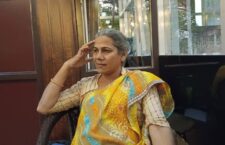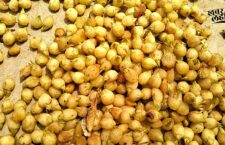Women’s lack of access to land rights is an especially complex issue in Majuli, where most agrarian households do not formally own the land that they cultivate on. Given that women are already denied land ownership due to patriarchal social norms, the situation is worsened in a region where land ownership is generally uncommon.
Street plays are a common sight in Majuli, a region with a rich culture steeped in the neo-Vaishnavite revival of performance and art. While these plays have historically portrayed religious scenes and themes, a recent rendition shed light on a pressing social issue—women’s land rights.
Women’s lack of access to land rights is an especially complex issue in Majuli, where most agrarian households do not formally own the land that they cultivate on. Given that women are already denied land ownership due to patriarchal social norms, the situation is worsened in a region where land ownership is generally uncommon.
“Although women are the ones who do most of the work in the field, the land still isn’t in their name,” says Pronab Doley, a field coordinator for Ayang Trust, a Majuli-based nonprofit. Pronab helped design the play. Titled Maati Aaru Mohila (Land and Women), the play emphasises the need for women’s land ownership. Adith, a theatre artist, helped community members conceptualise the play by drawing on the experiences of landless women from the community.
By depicting the experiences of local women, the play highlights the importance of land rights and the numerous challenges women must confront when attempting to secure their legal rights over land. The participants of the play believe it is a medium that allowed them to reach out to an audience that may not have been able to understand the issue if they were given a pamphlet or a presentation instead.
Pronamika Doley, another community member who worked on the play, says, “People found the play easy to understand. The audience told us that in the past they hadn’t thought about the importance of land rights, especially for widowed and abandoned women who are left with no means to secure their livelihood.” Buoyed by the positive response of the community, the locals involved in the production of the play have continued to help secure land rights for women in the region. Community members such as Pronamika received training under the local circle office and the district legal service authority to better understand the process for acquiring land rights, and are now guiding those in the community who approach them for help on these matters.
As told to IDR.
Pronamika Pegu Doley is one of the directors of Lekope Majuli Women Farmer Producer Company. Pronab Doley is a field coordinator for Ayang Trust.
Watch the complete version of Maati Aaru Mohila.
यदि आप हमको सपोर्ट करना चाहते है तो हमारी ग्रामीण नारीवादी स्वतंत्र पत्रकारिता का समर्थन करें और हमारे प्रोडक्ट KL हटके का सब्सक्रिप्शन लें’

